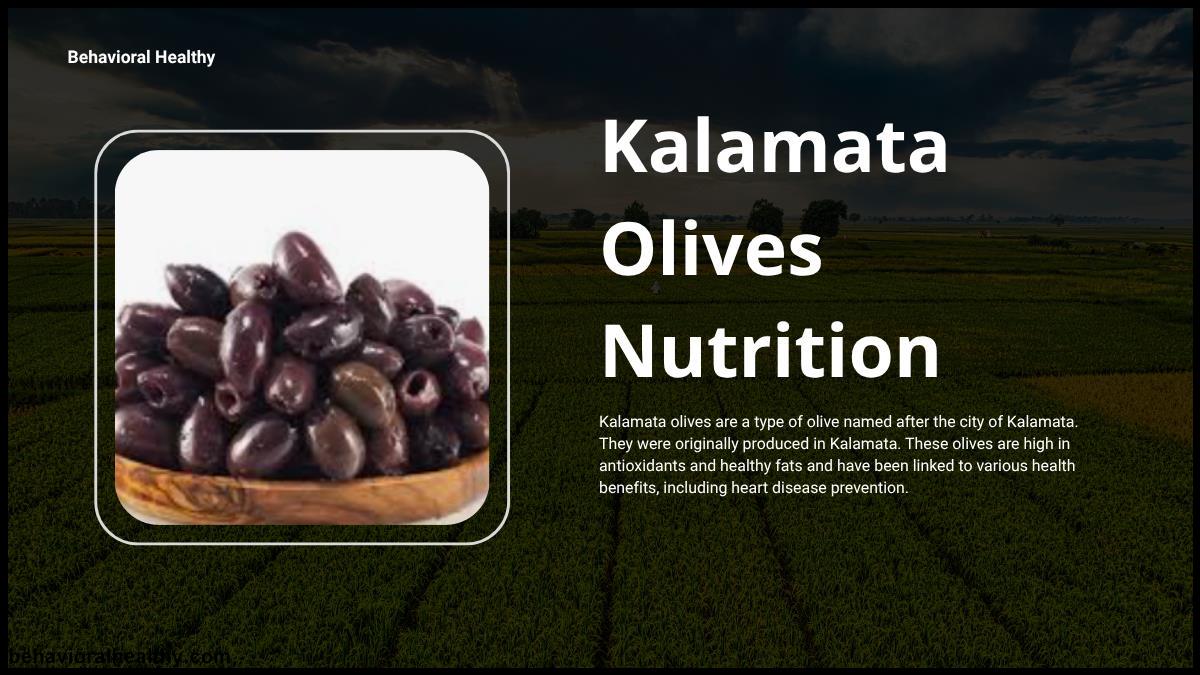Kalamata olives are a type of olive named after the city of Kalamata. They were originally produced in Kalamata.
Table of Contents
Kalamata Olives - Health Benefits and Nutrients
Kalamata olives are a type of olive named after the city of Kalamata. They were originally produced in Kalamata. These olives are high in antioxidants and healthy fats and have been linked to various health benefits, including heart disease prevention.
Kalamata olives are nutritional powerhouses that provide numerous health advantages beyond their gastronomic appeal. Continue reading the blog to learn more about Kalamata olives.
Benefits of Kalamata Olives
- Reduce The Risk Of Heart Disease
You may reduce your risk of heart disease by having kalamata olives. Olives contain hydroxytyrosol, which is the reason for this. The antioxidant hydroxytyrosol has been demonstrated to raise HDL cholesterol levels by decreasing LDL cholesterol.
While high HDL cholesterol is associated with a lower risk of both heart attack and stroke, high LDL cholesterol is associated with an increased risk of both. Consuming foods that have low cholesterol levels can help your heart health in general. Such dietary habits align with a cardiac-friendly diet, which focuses on maintaining HDL and lowering LDL cholesterol levels.
- Powerful Antioxidants
Kalamata olives are high in polyphenols and antioxidants, which fight oxidative stress and protect the body from chronic disease. Oleuropein and tyrosol are the most noteworthy polyphenols found in olives. These chemicals have anti-inflammatory, anticancer, and neuroprotective effects.
Antioxidants aid in inhibiting the oxidation of LDL cholesterol, which is a crucial step in the development of atherosclerosis. They also help to slow down the aging process by minimizing cellular damage.
- Anti-Inflammatory Qualities
Numerous illnesses, including diabetes, arthritis, heart disease, and some types of cancer, are caused by chronic inflammation. Oleocanthal, one of the anti-inflammatory substances found in kalamata olives, reduces inflammation like that of ibuprofen.
Because of this, kalamata olive is a natural means of lowering inflammation and may even lessen inflammation symptoms, including autoimmune disorders and arthritis.
- Preserve Brain Function
Kalamata olives contain antioxidants that are good for the brain. It has been demonstrated that polyphenols enhance cognitive function, reduce oxidative brain damage, and may offer some protection against neurodegenerative illnesses, including Parkinson's and Alzheimer's.
Additionally, monounsaturated fats — like those found in Masago help maintain brain cell members' integrity and facilitate improved intercellular communication.
- Health of the Skin and Hair
Kalamata olives' rich vitamin E and antioxidant content help nourish skin and shield it from UV rays and early aging. By enhancing blood flow to the scalp and bolstering follicle health, vitamin E also encourages healthy hair.
Furthermore, olive' oleic acid preserves the suppleness and moisture of the skin, making it an organic part of a diet that promotes attractiveness.
Kalamata Olives Nutrition
Although olives are normally heavy in sodium, kalamata olives nutrition is excellent for you since they are a nutritional powerhouse replicated in micro and macronutrients, including,
- Iron
- Copper
- Calcium
- Vitamin A
- Vitamin E
- Magnesium
Nutrients Per Serving
One serving of kalamata olives contains around 15 grams, or 6-8 olives, depending on their size. One serving contains:
- Calories: 35.
- Fat: 2.5 g.
- Sodium: 320 mg.
- Carbohydrate: 2 grams
- Fiber: one gram
- Protein: 2 grams.
Portion Sizes
Kalamata olives are healthy when consumed in moderation, but remember that they, like all olives, contain a lot of sodium. For a person who consumes 2,000 calories daily, one serving has approximately 13% of the daily salt requirement. Excess salt in your diet makes your heart work harder to accomplish its function, which can lead to illnesses, including congestive heart failure and kidney disease.
Limit yourself to one serving of olives each day, and aim to keep your salt intake at or below 2,300 mg. To help lower the amount of sodium in olives, rinse them in water before eating them.
How to Include Kalamata Olives in Your Diet
Kalamata olives are versatile and can be included in a variety of cuisines. Here are some easy ways to incorporate them:
- Toss them into salads such as Greek salad.
- Add to pizzas and pasta dishes.
- Use in tapenades or olive spreads.
- Serve as part of a charcuterie board.
- Combine with feta cheese and herbs for a snack.
- Chop and add to omelet or scrambled eggs.
It is worth mentioning that the brining procedure in Kalamata olives results in a high sodium content. If you are on a low-sodium diet, rinse them with water or choose alternatives.
Precautions and Considerations
While Kalamata olives are extremely healthful, keep the following points in mind.
High Sodium Intake - A single serving may contain over 500mg of sodium. People with high blood pressure or sodium-sensitive conditions should limit their intake.
Caloric Density - Olives are calorie-dense due to their high fat content. Consume them in moderation, particularly if you are noticing your caloric intake.
Winding It Up
Kalamata olives are more than a tasty addition to your meals; they are a nutritional powerhouse packed with healthy fats, potent antioxidants, and essential elements. Their benefits include cardiovascular health, anti-inflammation, brain function, digestion, and skin health.
These olives, a staple of the Mediterranean diet, are a taste and health-boosting addition to all types of meals. Remember to consume them in moderation due to their sodium concentration so that you will reap their numerous advantages for years. If you want to buy these seeds, then go to this.

